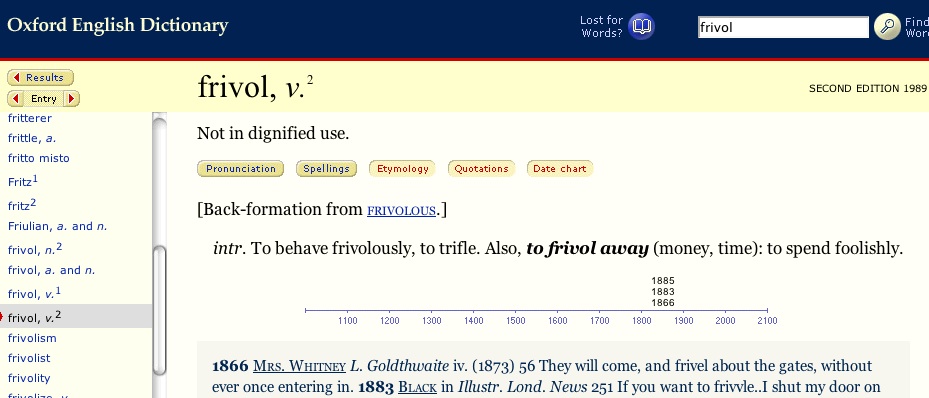Polysynthet- (Crosspost from LL)
This morning Mark posted a paragraph from Russell which read in part:
We are given to understand that a Patagonian can understand you if you say 'I am going to fish in the lake behind the western hill', but that he cannot understand the word 'fish' by itself. (This instance is imaginary, but it represents the sort of thing that is asserted.)
I wonder if someone had been telling Russell about verb roots in polysynthetic languages, which often are what linguists call 'bound', i.e. cannot stand on their own as well-formed words. Rather, they must be inflected with one or more affixes to be well-formed utterances of the language.
Consider, for example, this description of Inuktitut verb stems from a translation of Elke Nowak's book Transforming the Images: Ergativity and Transitivity in Inuktitut, which allows a preview of itself to be nicely Googled up, hooray:
Inuktitut verbs can be formally described as nuclei that attain the status of a free-standing form by the addition of an inflectional ending containing information as to person, number, valence and mood. ...
(3) tukisi-paanga
. understand-3sS.1sO.tr.cond
. 'if s/he understood me'
The stem tukisi- means 'understand', all right, but it can't be uttered on its own; it's not a word. It might not be quite appropriate to say that an Inuktitut speaker wouldn't understand tukisi- on its own, but they certainly wouldn't take it as a meaningful utterance.
Even in English we have several roots with this property of needing an affix or two to make them independently utterable. In our case, they're mostly roots that came into English from a Romance language, but they're now a major subsystem in the vocabulary. Consider electr- for example. It shows up in electr-ic and electr-on and other words derived from those, but it is itself a unit of English morphology with a form and meaning. Or similarly the stem in anxi-ous and anxi-ety, or feroc-ious and feroc-ity, or frivol-ous and frivol-ity.
Those are just to give you the idea -- in some languages, all the roots and stems have this property of needing additional endings to make them possible utterances. The consequence is that, of course, you might not be able to say 'fish' by itself, without saying "my fish" or "I'm going fishing" or "Would you like to fish?"
Russell is right then to wonder what infants acquiring such languages do. In particular, do they invent uninflected forms of these bound roots to use as 'baby talk'? In fact, judging from this abstract, they don't. I don't have time to do any more investigating right now but I'd guess that the kids might use some frequent or default suffix as a generic way produce morphologically-well formed utterances until they've mastered the full complex system. I'll doublecheck on that and get back to you.
Update: Pursuant to the comment below from Ricky, I went to check on frivol- -- I'd forgotten that it had a free use! It's a back-formation, though, so at least it used to be a bound root; check out the OED's rather severe usage comment:

